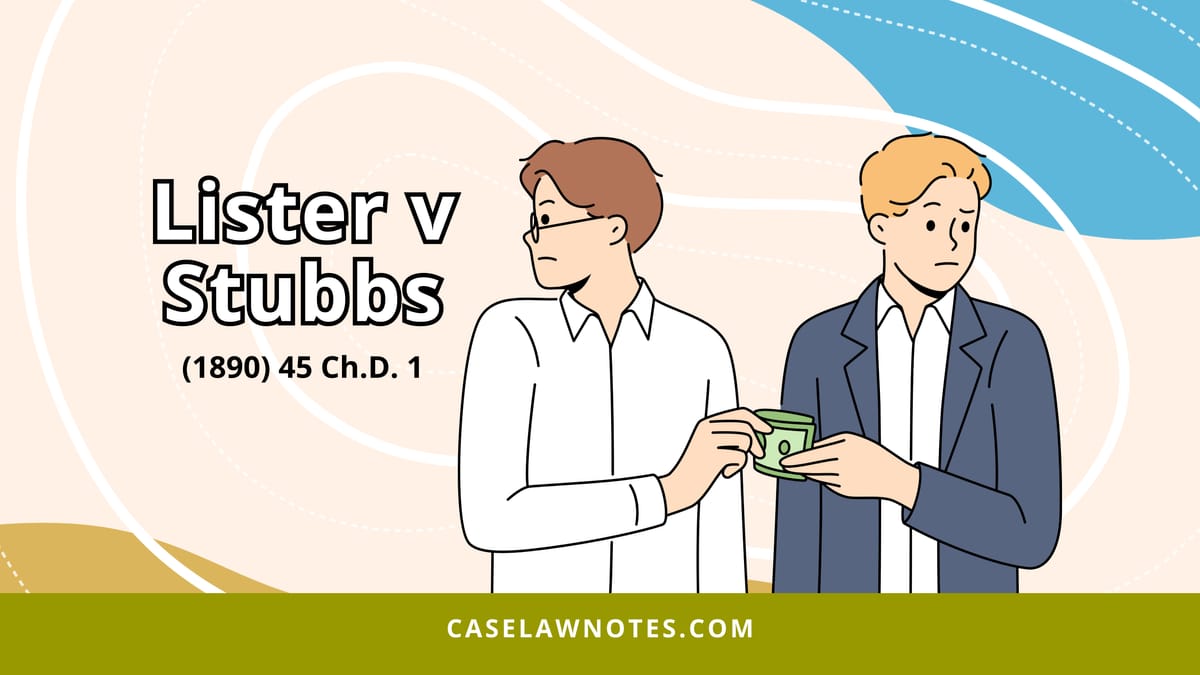Sinclair Investments (UK) Ltd v Versailles Trade Finance Ltd
Sinclair Investments v Versailles Trade Finance (2011) addressed crucial issues on fiduciary duties and proprietary claims over misappropriated funds. The case clarified the principles of tracing assets and reaffirmed the equitable treatment of beneficiaries.
🏛️ Court: Court of Appeal (Civil Division)
🗓️ Judgment Date: 29 March 2011
🗂️ Where Reported: [2011] EWCA Civ 347; [2012] Ch. 453
📍 Jurisdiction: United Kingdom
⭐ Key Takeaways
Trust and Equitable Remedies: Secret commissions received by agents are held in constructive trust for the principal, affording the principal both personal and proprietary remedies against the agent.
🔒 Legal Issues
The case of Sinclair Investments (UK) Ltd v Versailles Trade Finance Ltd centred on the legal issues surrounding fiduciary duties, proprietary claims, and the tracing of misappropriated funds.
The primary legal question was whether a beneficiary could claim a proprietary interest in profits or assets acquired by a fiduciary in breach of their duties and whether these profits or assets could be traced to third parties.
The case examined the application of equitable principles to determine if and when proprietary claims could be made against assets acquired through breaches of fiduciary duty, particularly in complex financial transactions involving multiple parties and mixed funds.
📚 Material Facts
Sinclair Investments, as assignee of claims from Trading Partners Ltd (TPL), sued Versailles Trade Finance Ltd and others, including Carlton Cushnie, the second defendant's principal shareholder.
Cushnie had allegedly breached his fiduciary duties as a director of TPL by misusing funds to make unauthorised gains.
He sold shares in the second defendant for £28.69 million, which Sinclair claimed he held on constructive trust for TPL.
Sinclair alleged this claim was valid against money advanced by banks and sought the traceable proceeds from Cushnie’s unauthorised gain.

Additionally, Sinclair claimed a proprietary interest in mixed funds passed by TPL to the first defendant (a wholly-owned trading subsidiary of the second defendant), alleging entitlement to the mixed fund and the right to trace this fund into payments made to banks by administrative receivers.
The primary dispute revolved around the nature of the claims (proprietary vs personal) against Cushnie and the extent to which these claims could be enforced against the mixed funds and other assets involved in the transactions.
🧑⚖️ Judgment
The Court of Appeal dismissed the first claim, holding that the proceeds of Cushnie’s share sales were subject to a personal claim by TPL against him, not a proprietary claim.
The court also ruled that the claimant was only entitled to make a proprietary claim to the mixed fund from when the banks became aware of the claimant's proprietary interest.
This judgment clarified that proprietary claims could not be made in respect of profits or assets acquired by a fiduciary in breach of duty unless the asset or money was beneficially owned by the claimant or derived from opportunities beneficially owned by them.
The court found that Cushnie’s acquisition of shares in the second defendant had not amounted to an acquisition of property belonging to TPL, and hence, Sinclair, as TPL’s assignee, did not have a proprietary claim to the proceeds of the share sale.
Therefore, TPL was entitled only to a personal remedy regarding the profits realised from that sale, not a proprietary claim.
🔑 Legal Reasoning
The decision was based on the distinction between proprietary and personal claims in the context of fiduciary breaches.
The court recognised that while fiduciaries are accountable for any benefits from breaches of duty, not all such benefits give rise to proprietary claims.
For a proprietary claim to arise, the asset or money must have been beneficially owned by the claimant or derived from opportunities beneficially owned by them.
In this case, the proceeds of Cushnie’s share sales, though obtained through breach of fiduciary duty, were not assets that had belonged to TPL, nor were they derived from opportunities beneficially owned by TPL.

The court thus concluded that the claimant’s remedy was limited to a personal claim against Cushnie, not a proprietary claim over the share sale proceeds.
The court's approach emphasised the importance of clear ownership and rights over assets in establishing proprietary claims.
It underscored that a fiduciary misappropriation of funds or opportunities does not automatically result in a proprietary claim for the beneficiary.
This approach aligns with the principle of equity, which aims to prevent unjust enrichment of the fiduciary while respecting the legal rights and ownership of assets.
The court also clarified the criteria for establishing notice in the context of tracing claims.
It differentiated between notice of the facts constituting a breach of fiduciary duty and knowledge of the law applicable to those facts.
The court ruled that having notice of the relevant facts was sufficient for a claim to succeed, highlighting the importance of factual awareness over legal understanding in tracing claims.
⚖️ Legal Principles
The case of Sinclair Investments (UK) Ltd v Versailles Trade Finance Ltd established legal principles regarding fiduciary duties and proprietary claims.
It clarified that while fiduciaries must account for benefits obtained through breaches of duty, not all such benefits give rise to proprietary claims.
The decision distinguished between assets or money beneficially owned by the claimant and those not, with only the former giving rise to proprietary claims.
The judgment also highlighted the importance of establishing notice in tracing claims, focusing on the parties' factual awareness.
This case contributes significantly to the legal understanding of fiduciary responsibilities, the nature of claims arising from fiduciary breaches, and the tracing of misappropriated funds in complex financial transactions.
🎓 Quiz
1. On what basis did the Court of Appeal dismiss the appeal regarding proprietary interests in the sale proceeds of shares?
a. Shares not being property that could host a proprietary claim
b. Misapplication of fiduciary duties by the shareholder
c. Lack of evidence of actual fraud
d. Inability to trace the funds directly back to the fiduciary breaches
🙋 Answer
d. Inability to trace the funds directly back to the fiduciary breaches
2. What was the role of Versailles Trade Finance Ltd in the fraudulent scheme?
a. They were responsible for auditing and reporting financial misconduct
b. They indirectly engaged in transferring funds to offshore accounts for Trading Partners Ltd
c. They managed and administered Trading Partners Ltd's business transactions
d. They provided legal cover for illicit transactions
🙋 Answer
c. They managed and administered Trading Partners Ltd's business transactions
3. What outcome did the court reach regarding the proprietary interest in mixed funds?
a. Proprietary interests were completely denied
b. Only personal claims were recognised
c. No claims were recognised due to insufficient evidence
d. Proprietary claims were upheld from the date banks had notice
🙋 Answer
d. Proprietary claims were upheld from the date banks had notice
4. Why were Sinclair Investments unable to establish a proprietary claim to the proceeds from the sale of shares?
a. They failed to file the claim within the statutory period
b. The funds used were not directly traceable to them
c. The shares were sold by a third party, not the fiduciary
d. The funds were considered clean under the law
🙋 Answer
b. The funds used were not directly traceable to them
5. What principle did the court apply regarding the treatment of funds once fiduciary breaches were known?
a. Division of funds proportionately among claimants
b. All transactions post-breach were nullified
c. The beneficiary could assert a claim against the remaining funds
d. Immediate freezing of all related accounts
🙋 Answer
c. The beneficiary could assert a claim against the remaining funds




Discussion